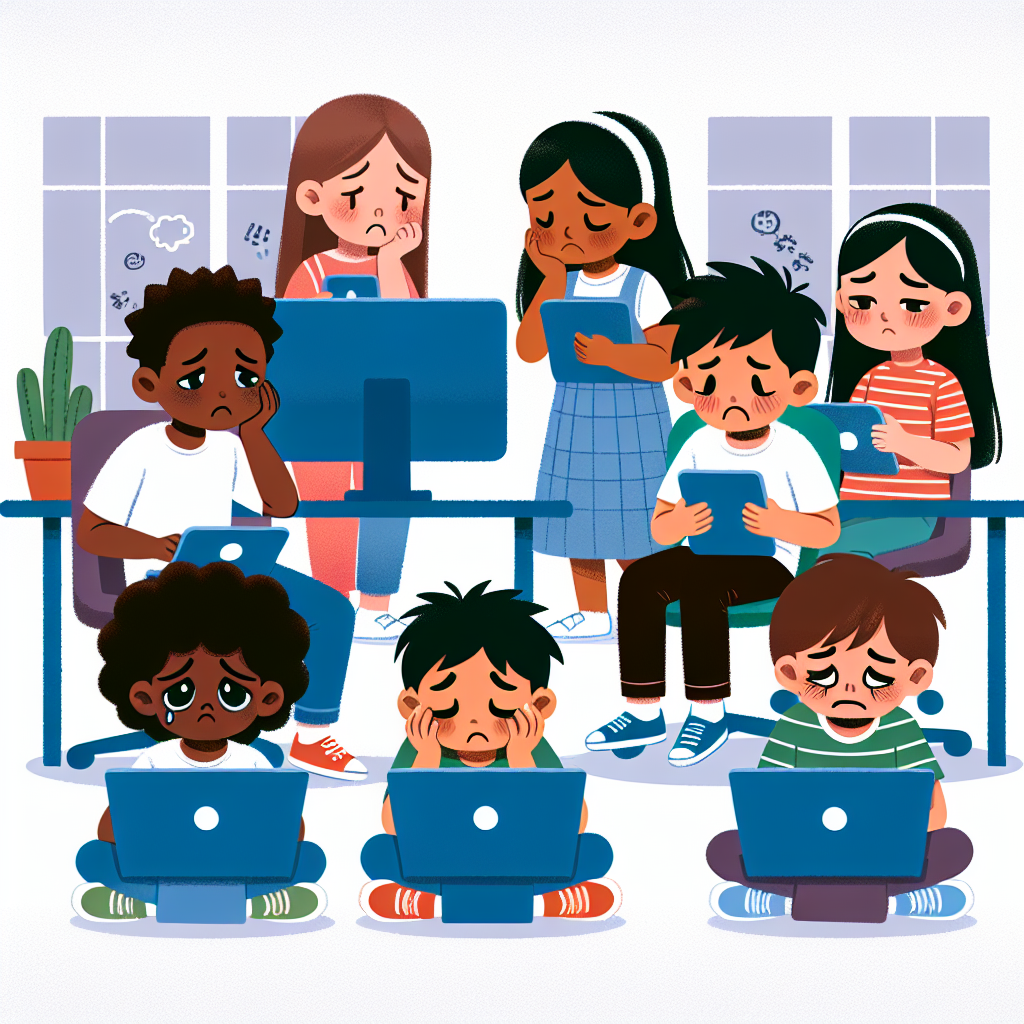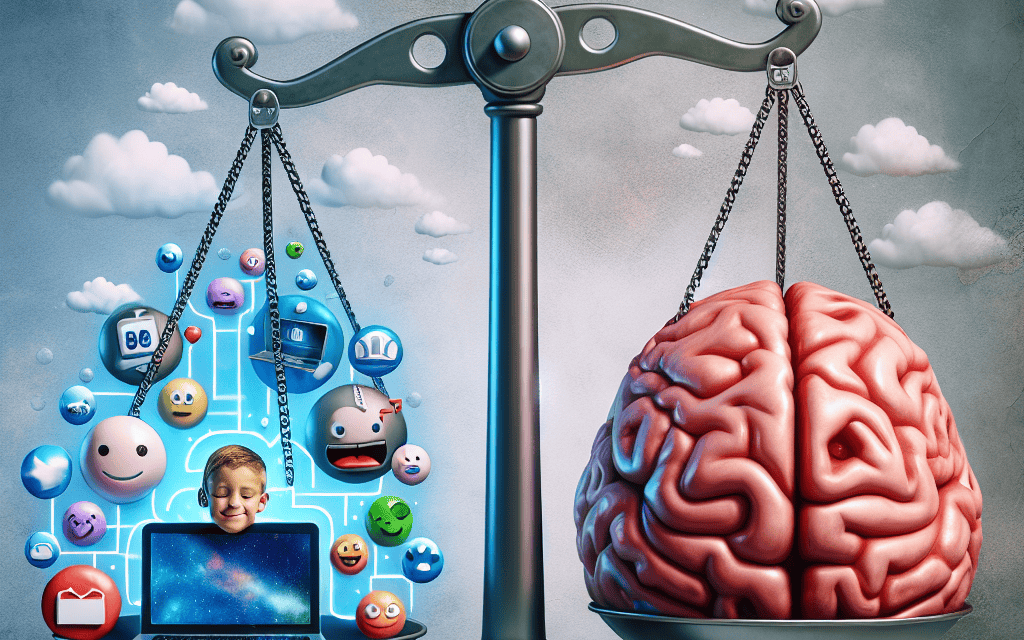How Internet Usage Affects Children’s Mental Health

The internet has become an integral part of modern life, offering a wealth of information and opportunities for connection. However, its impact on children’s mental health is a growing concern. As children spend more time online, understanding the effects of internet usage on their mental well-being is crucial. This article explores the multifaceted relationship between internet usage and children’s mental health, examining both the positive and negative aspects.
The Positive Impacts of Internet Usage on Children’s Mental Health
While much of the discourse around internet usage and mental health focuses on the negative aspects, it’s important to acknowledge the positive impacts as well. The internet can be a powerful tool for learning, socialization, and personal growth.
Access to Educational Resources
The internet provides children with unprecedented access to educational resources. Online platforms offer a wide range of learning materials, from interactive lessons to educational videos, which can enhance children’s knowledge and skills.
For instance, websites like Khan Academy and Coursera offer free courses on various subjects, allowing children to explore topics beyond their school curriculum. This access can foster a love for learning and improve academic performance, contributing positively to children’s mental health by boosting their confidence and self-esteem.
Moreover, the internet enables children to engage in self-directed learning, allowing them to pursue their interests at their own pace. This autonomy can lead to a sense of accomplishment and satisfaction, which are important components of mental well-being.
Social Connectivity and Support
The internet facilitates social connectivity, allowing children to maintain relationships with family and friends, even when physical distance is a barrier. Social media platforms, messaging apps, and video calls enable children to stay connected, providing a sense of belonging and support.
For children who may feel isolated or struggle with face-to-face interactions, online communities can offer a safe space to express themselves and find like-minded peers. These connections can be particularly beneficial for children with social anxiety or those who are part of marginalized groups, as they can find support and understanding online.
Furthermore, online support groups and forums can provide children with access to mental health resources and peer support, helping them cope with challenges and reducing feelings of loneliness and isolation.
Development of Digital Skills
In today’s digital age, proficiency in digital skills is essential. Internet usage helps children develop these skills, which are crucial for their future education and career prospects. By navigating online platforms, children learn how to use technology effectively, enhancing their problem-solving and critical thinking abilities.
These skills can boost children’s confidence and prepare them for the demands of the modern workforce. Additionally, digital literacy can empower children to use the internet responsibly, reducing the risk of negative mental health impacts associated with inappropriate or excessive internet use.
Exposure to Diverse Perspectives
The internet exposes children to diverse perspectives and cultures, broadening their understanding of the world. This exposure can foster empathy, tolerance, and open-mindedness, contributing positively to children’s social and emotional development.
By engaging with different viewpoints and cultures online, children can develop a more nuanced understanding of global issues and learn to appreciate diversity. This awareness can enhance their social skills and emotional intelligence, which are important for mental well-being.
Opportunities for Creative Expression
The internet offers numerous platforms for creative expression, allowing children to showcase their talents and explore their interests. Whether through blogging, video creation, or digital art, children can express themselves creatively, which can be therapeutic and boost their self-esteem.
Creative expression can also serve as a coping mechanism for children dealing with stress or emotional challenges. By channeling their emotions into creative projects, children can process their feelings and gain a sense of control over their experiences.
The Negative Impacts of Internet Usage on Children’s Mental Health
Despite the positive aspects, excessive or inappropriate internet usage can have detrimental effects on children’s mental health. Understanding these negative impacts is crucial for mitigating risks and promoting healthy internet habits.
Cyberbullying and Online Harassment
Cyberbullying is a significant concern associated with internet usage. Unlike traditional bullying, cyberbullying can occur 24/7 and reach a wide audience, making it particularly harmful. Children who experience cyberbullying may suffer from anxiety, depression, and low self-esteem.
According to a study by the Cyberbullying Research Center, approximately 34% of students have experienced cyberbullying at some point in their lives. The anonymity of the internet can embolden bullies, leading to more severe and persistent harassment.
To combat cyberbullying, it’s essential for parents and educators to educate children about online safety and encourage open communication. Children should feel comfortable reporting cyberbullying incidents and seeking support from trusted adults.
Exposure to Inappropriate Content
The internet is a vast repository of information, but not all of it is suitable for children. Exposure to inappropriate content, such as violence, pornography, or hate speech, can have negative effects on children’s mental health and development.
Children who encounter such content may experience fear, confusion, or desensitization to violence. It’s crucial for parents to monitor their children’s internet usage and use parental controls to restrict access to inappropriate websites.
Additionally, open discussions about online content can help children develop critical thinking skills and make informed decisions about what they view online.
Internet Addiction and Screen Time
Excessive internet usage can lead to internet addiction, characterized by an inability to control online activities despite negative consequences. Internet addiction can interfere with daily life, affecting academic performance, social relationships, and mental health.
Children who spend excessive time online may experience symptoms such as irritability, anxiety, and withdrawal from offline activities. According to a study published in the journal “Computers in Human Behavior,” internet addiction is associated with increased levels of depression and anxiety in adolescents.
To prevent internet addiction, it’s important for parents to set boundaries on screen time and encourage a balanced lifestyle that includes offline activities and face-to-face interactions.
Impact on Sleep Patterns
Excessive screen time, particularly before bedtime, can disrupt children’s sleep patterns. The blue light emitted by screens can interfere with the production of melatonin, a hormone that regulates sleep, leading to difficulties falling asleep and poor sleep quality.
Sleep deprivation can have serious consequences for children’s mental health, including increased irritability, difficulty concentrating, and heightened risk of anxiety and depression. A study published in the journal “Pediatrics” found that children who use electronic devices before bed are more likely to experience sleep disturbances.
To promote healthy sleep habits, parents should encourage children to establish a bedtime routine that includes turning off electronic devices at least an hour before bed.
Social Comparison and Self-Esteem
Social media platforms often present idealized versions of reality, leading children to engage in social comparison. Constant exposure to curated images and lifestyles can negatively impact children’s self-esteem and body image.
Children who compare themselves to others online may feel inadequate or develop unrealistic expectations about their appearance and achievements. This can lead to feelings of insecurity, anxiety, and depression.
To mitigate the effects of social comparison, it’s important for parents to have open conversations with their children about the nature of social media and encourage them to focus on their unique strengths and qualities.
Strategies for Promoting Healthy Internet Usage
Given the potential risks associated with internet usage, it’s important to implement strategies that promote healthy online habits and protect children’s mental health.
Setting Boundaries and Limits
Establishing clear boundaries and limits on internet usage is crucial for preventing excessive screen time and promoting a balanced lifestyle. Parents should work with their children to set reasonable limits on daily screen time and ensure that online activities do not interfere with other important aspects of life, such as schoolwork, physical activity, and family time.
Using tools such as parental controls and screen time management apps can help enforce these limits and provide insights into children’s online habits.
Encouraging Open Communication
Open communication between parents and children is essential for addressing concerns related to internet usage. Parents should create a safe and supportive environment where children feel comfortable discussing their online experiences and any challenges they may face.
By maintaining open lines of communication, parents can provide guidance and support, helping children navigate the complexities of the online world and make informed decisions about their internet usage.
Promoting Digital Literacy
Digital literacy is a critical skill for navigating the internet safely and responsibly. Parents and educators should teach children how to evaluate online content, recognize misinformation, and protect their privacy.
By developing digital literacy skills, children can become more discerning consumers of online information and better equipped to handle the challenges of the digital age.
Encouraging Offline Activities
Encouraging children to engage in offline activities is important for promoting a balanced lifestyle and reducing the risk of internet addiction. Parents should encourage children to participate in hobbies, sports, and social activities that do not involve screens.
By providing opportunities for offline engagement, children can develop a diverse range of skills and interests, which can contribute positively to their mental health and well-being.
Modeling Healthy Internet Habits
Parents play a crucial role in modeling healthy internet habits for their children. By demonstrating responsible internet usage and setting a positive example, parents can influence their children’s online behavior.
Parents should be mindful of their own screen time and prioritize face-to-face interactions with their children. By modeling a balanced approach to internet usage, parents can help their children develop healthy habits that support their mental health.
Conclusion
The internet is a powerful tool that offers both opportunities and challenges for children’s mental health. While it provides access to educational resources, social connectivity, and creative expression, it also poses risks such as cyberbullying, exposure to inappropriate content, and internet addiction.
By understanding the complex relationship between internet usage and children’s mental health, parents and educators can implement strategies to promote healthy online habits and protect children’s well-being. Through open communication, digital literacy education, and balanced lifestyle choices, children can harness the benefits of the internet while minimizing its potential negative impacts.
Ultimately, fostering a healthy relationship with the internet is essential for supporting children’s mental health and helping them thrive in the digital age.





